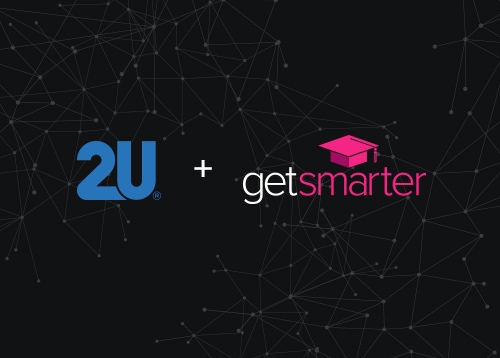You have /5 articles left.
Sign up for a free account or log in.

2U
The online program management company 2U is describing its acquisition of GetSmarter as an effort to expand into new course modalities and parts of the world, but analysts are divided on whether the company is getting its money’s worth.
The Lanham, Md.-based company said last week that it is in the process of acquiring GetSmarter, an online education start-up, for $103 million (plus up to $20 million in incentives). GetSmarter, which was founded in Cape Town but also has an office in London, will operate as an independent, wholly-owned subsidiary.
The acquisition will give 2U immediate access to several markets in which it currently does not operate. Since its founding, 2U has established itself as a selective online program management (OPM) firm. While other companies in the OPM market will contract with entire institutions and help them launch a range of programs, 2U picks individual graduate programs that its internal predictions suggest will be successful if offered online. As of last month, 2U had launched or announced 41 such programs from 18 colleges and universities.
GetSmarter does not offer degrees, but eight- to 16-week courses that award certificates. The courses, which are aimed at working professionals, normally cost around $2,000. GetSmarter has a couple of U.S. partner institutions -- including Harvard University and the University of Chicago -- but the rest are located in South Africa and the U.K.
Susan Cates, 2U’s chief operating officer, said in an interview that the acquisition is 2U’s response to demand from institutional partners to work together on online education offerings beyond graduate programs.
“We believe strongly in the impact that the degree programs that we support have on the lives of students,” Cates said. “But as we look at thinking about meeting the needs of our university partners and providing options for learners who are looking for different types of experiences at various points in their lives, this is a natural extension of what we do.”
Massive open online course platforms such as Coursera and edX have over the last couple of years made the same argument. In those cases, however, the companies have used the argument to explain why they were expanding into the for-credit degree program market. Coursera, for example, said in March that it hopes to offer 15 to 20 degree programs by the end of 2019, while edX has steadily expanded its lineup of MicroMasters programs. Both programs give learners the opportunity to take some of the courses and earn certificates or complete them all for a degree.
Cates said it is too early to talk about how GetSmarter’s shorter courses and 2U’s degree programs might connect to one another, but added that “there’s certainly the opportunity for interplay” between them, and also between individual shorter courses.
Other than saying that “the interest from our partners has been pretty broad across academic disciplines,” Cates did not detail how many courses 2U partner institutions might offer on GetSmarter in the near future.
In addition to GetSmarter’s presence in the certificate market, 2U also saw the company as an opportunity to get its foot in the door internationally, Cates said. Since launching in 2008, GetSmarter has delivered courses to more than 50,000 learners in 150 countries, she said.
“The global aspect of their business is extremely attractive to us,” Cates said. “We very much see this as our core international strategy over the new few years. … I expect at some point we’ll offer international graduate programs.”
Trace Urdan, an independent industry analyst, said 2U’s plans for international expansion are more significant than the company’s move into the noncredit certificate space. He pointed out that building relationships with colleges can be expensive -- especially so when the college is located on a different continent -- and that 2U has with a single acquisition introduced itself to a group of potential new partners.
“When you look at what they paid for these new relationships, it’s kind of a steal,” Urdan said in an interview.
Howard Lurie, a principal analyst at the consulting and research firm Eduventures, was more skeptical about the acquisition. GetSmarter boasts that it gives learners access to coaches who provide “personalized, people-mediated support,” an approach the company said has led to an average course completion rate of 88 percent. But that same approach could prove expensive to scale up, as adding learners would mean adding coaches, Lurie said in an interview.
The international aspect also comes with administrative and logistical challenges, from becoming familiar with different countries’ higher education systems to organizing across time zones, Lurie said.
“It does make sense,” Lurie said about the acquisition. “Is it a total game changer? It’s probably too early to say.”








